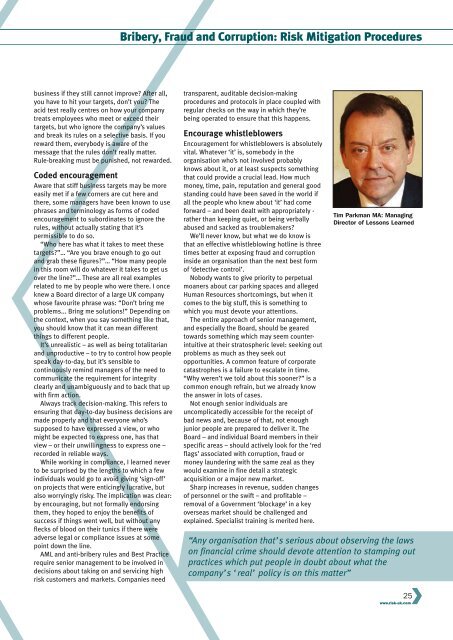RiskUKSeptember2017
You also want an ePaper? Increase the reach of your titles
YUMPU automatically turns print PDFs into web optimized ePapers that Google loves.
Bribery, Fraud and Corruption: Risk Mitigation Procedures<br />
business if they still cannot improve? After all,<br />
you have to hit your targets, don’t you? The<br />
acid test really centres on how your company<br />
treats employees who meet or exceed their<br />
targets, but who ignore the company’s values<br />
and break its rules on a selective basis. If you<br />
reward them, everybody is aware of the<br />
message that the rules don’t really matter.<br />
Rule-breaking must be punished, not rewarded.<br />
Coded encouragement<br />
Aware that stiff business targets may be more<br />
easily met if a few corners are cut here and<br />
there, some managers have been known to use<br />
phrases and terminology as forms of coded<br />
encouragement to subordinates to ignore the<br />
rules, without actually stating that it’s<br />
permissible to do so.<br />
“Who here has what it takes to meet these<br />
targets?”… “Are you brave enough to go out<br />
and grab these figures?”… “How many people<br />
in this room will do whatever it takes to get us<br />
over the line?”… These are all real examples<br />
related to me by people who were there. I once<br />
knew a Board director of a large UK company<br />
whose favourite phrase was: “Don’t bring me<br />
problems... Bring me solutions!” Depending on<br />
the context, when you say something like that,<br />
you should know that it can mean different<br />
things to different people.<br />
It’s unrealistic – as well as being totalitarian<br />
and unproductive – to try to control how people<br />
speak day-to-day, but it’s sensible to<br />
continuously remind managers of the need to<br />
communicate the requirement for integrity<br />
clearly and unambiguously and to back that up<br />
with firm action.<br />
Always track decision-making. This refers to<br />
ensuring that day-to-day business decisions are<br />
made properly and that everyone who’s<br />
supposed to have expressed a view, or who<br />
might be expected to express one, has that<br />
view – or their unwillingness to express one –<br />
recorded in reliable ways.<br />
While working in compliance, I learned never<br />
to be surprised by the lengths to which a few<br />
individuals would go to avoid giving ‘sign-off’<br />
on projects that were enticingly lucrative, but<br />
also worryingly risky. The implication was clear:<br />
by encouraging, but not formally endorsing<br />
them, they hoped to enjoy the benefits of<br />
success if things went well, but without any<br />
flecks of blood on their tunics if there were<br />
adverse legal or compliance issues at some<br />
point down the line.<br />
AML and anti-bribery rules and Best Practice<br />
require senior management to be involved in<br />
decisions about taking on and servicing high<br />
risk customers and markets. Companies need<br />
transparent, auditable decision-making<br />
procedures and protocols in place coupled with<br />
regular checks on the way in which they’re<br />
being operated to ensure that this happens.<br />
Encourage whistleblowers<br />
Encouragement for whistleblowers is absolutely<br />
vital. Whatever ‘it’ is, somebody in the<br />
organisation who’s not involved probably<br />
knows about it, or at least suspects something<br />
that could provide a crucial lead. How much<br />
money, time, pain, reputation and general good<br />
standing could have been saved in the world if<br />
all the people who knew about ‘it’ had come<br />
forward – and been dealt with appropriately -<br />
rather than keeping quiet, or being verbally<br />
abused and sacked as troublemakers?<br />
We’ll never know, but what we do know is<br />
that an effective whistleblowing hotline is three<br />
times better at exposing fraud and corruption<br />
inside an organisation than the next best form<br />
of ‘detective control’.<br />
Nobody wants to give priority to perpetual<br />
moaners about car parking spaces and alleged<br />
Human Resources shortcomings, but when it<br />
comes to the big stuff, this is something to<br />
which you must devote your attentions.<br />
The entire approach of senior management,<br />
and especially the Board, should be geared<br />
towards something which may seem counterintuitive<br />
at their stratospheric level: seeking out<br />
problems as much as they seek out<br />
opportunities. A common feature of corporate<br />
catastrophes is a failure to escalate in time.<br />
“Why weren’t we told about this sooner?” is a<br />
common enough refrain, but we already know<br />
the answer in lots of cases.<br />
Not enough senior individuals are<br />
uncomplicatedly accessible for the receipt of<br />
bad news and, because of that, not enough<br />
junior people are prepared to deliver it. The<br />
Board – and individual Board members in their<br />
specific areas – should actively look for the ‘red<br />
flags’ associated with corruption, fraud or<br />
money laundering with the same zeal as they<br />
would examine in fine detail a strategic<br />
acquisition or a major new market.<br />
Sharp increases in revenue, sudden changes<br />
of personnel or the swift – and profitable –<br />
removal of a Government ‘blockage’ in a key<br />
overseas market should be challenged and<br />
explained. Specialist training is merited here.<br />
Tim Parkman MA: Managing<br />
Director of Lessons Learned<br />
“Any organisation that’s serious about observing the laws<br />
on financial crime should devote attention to stamping out<br />
practices which put people in doubt about what the<br />
company’s ‘real’ policy is on this matter”<br />
25<br />
www.risk-uk.com

















